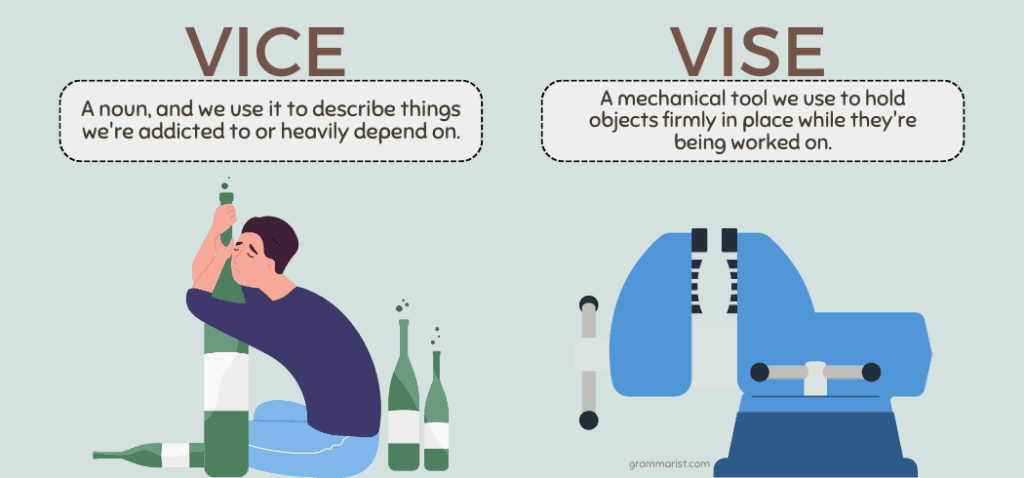English is a language with many words that have similar spellings and pronunciations but totally different meanings. Take the words “vice” and “vise,” for example. I know most people assume they’re the same word but with alternate spellings for regions. And, while that plays into it, we’re still looking at two different things here. Let me explain the difference between “vice” and “vise.”
Vice vs. Vise: Which Is Right?

Technically, both are right. It just depends on what you’re talking about and, sometimes, where you are.
“Vice” is a noun, and we use it to describe things we’re addicted to or heavily depend on.
“Vise” looks like it’s the UK spelling of “vice,” and that’s correct, but it was originally created to describe the tool used to clamp and hold things together. You’ll also see it used for other tools like vise grips or bench vises.
They’re homophones of each other, meaning they sound alike but have different meanings. But wait! I told you they also have the same meaning, didn’t I? Let’s explore that further.
What Is a Vice?
The word “vice,” when spelled with a C, actually has a ton of different meanings!
- A bad habit or immoral behavior, like smoking or drinking.
- A device used to hold things together or in place, such as a bench vice.
- A deputy or some sort of substitute or chancellor, like a vice president.
- Various tools used for cutting or shaping objects; vice chisel, vice grips, etc.
- A fault or defect in something, like if a building had a crack in the foundation, would be a vice in the foundation.
What Is a Vise?
Technically, “vise” is the correct spelling of a mechanical tool we use to hold objects firmly in place while they’re being worked on. It’s got two parallel jaws that open and close by a screw or lever mechanism.
Vises are mostly used in hobbies or professions like woodworking, metalworking, and other trades that require the holding of materials in place. Personally, I use vises when spraying my special edition book edges with paint. It helps keep all the pages tightly packed so they don’t stick together.
Vice and Vise as One in the Same
So, here’s where things get confusing. While they both have their own definitions, you can also use both spellings to describe the clamping tool because that’s what’s accepted in British English. But, to avoid any confusion, stick with the more common American spellings of “vice” for bad habits and “vise” for the tool.
Is It Vise or Vice Versa?
This is a common phrase that we use to mean “either way” or “the reverse.” To spell it correctly, use “vice versa.”
What Is the Plural of Vice?
The plural of “vice” is “vices.”
- He had many vices, including smoking, drinking, and heavy drugs.
What’s Another Word for Vice?
That’s easy! But I’ll give you examples for both the tool and habit, just in case.
Bad Habit
- Sin
- Immorality
- Depravity
- Corruption
- Wickedness
- Iniquity
- Evil
- Wrongdoing
Tool
- Clamp
- Grips
- Press
How Do You Use Vice in a Sentence?

Here are some sentences that demonstrate the use of the word “vice” in all its forms.
- My late brother’s vices included things like online gambling and drinking.
- The vice principal called me today to talk about my son’s behavior.
- Our company’s vice president is responsible for overseeing the sales department where I work.
- My husband, a carpenter, used a vice to hold two pieces of wood in place while he built my bookshelf.
- We hired a structural engineer, and he discovered a vice in the building’s foundation that needs to be corrected.
- He loves that dog and vice versa.
Using Vise in a Sentence
- I use a set of hand vises to clamp my book pages together to spray paint the edges.
- Can you hand me those vise grips, please?
- His grip was like a vise around my wrist; he was so scared.
What’s Your Vice?
I hope my guide and spelling tips helped explain the different meanings and uses of the words “vice” and “vise.” Just remember, keep it simple and use the American spelling, and you’ll never get them mixed up again. “Vice” for the bad habit and “vise” for the tool.
Check out some other articles we covered:
